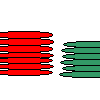Skip over navigation
Can you work out a winning strategy for any combination of biscuits?
Look for patterns in your winning moves and use them to find winning strategies.

Or search by topic
Number and algebra
Geometry and measure
Probability and statistics
Working mathematically
Advanced mathematics
For younger learners
Last Biscuit
Age 11 to 18
Challenge Level 





This game follows on nicely from Have You Got It?
This is a game for two players. You can play against the computer or with a friend.
It is a version of a well known game called Nim.
Each player can take biscuits in one of two ways:
- By taking any number they like from just one jar or
- By taking the same amount from both jars.
The winner is the person who takes the last biscuit/s.
Play the game several times.
Can you find a winning strategy?
Can you always win?
Does your strategy depend on whether or not you go first?
By clicking on the purple cog you can enter the settings menu and change the number of biscuits in each jar.
Can you work out a winning strategy for any combination of biscuits?
Look for patterns in your winning moves and use them to find winning strategies.
Is it best to start the game? Always?
When you've found some winning moves, explain why they work.
Can you describe the winning strategy if the jars start by containing 100 and 50 biscuits?
Can you describe the winning strategy if the jars start by containing 100 and 50 biscuits?
Printable NRICH Roadshow resource.
You may also like
Nim
Start with any number of counters in any number of piles. 2 players take it in turns to remove any number of counters from a single pile. The loser is the player who takes the last counter.

